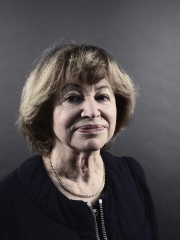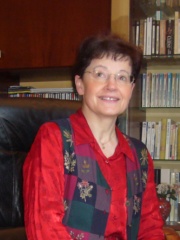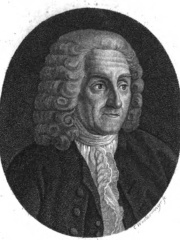
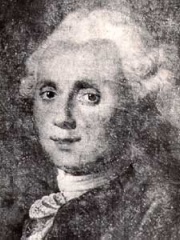
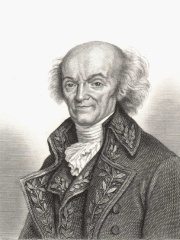
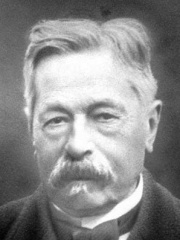
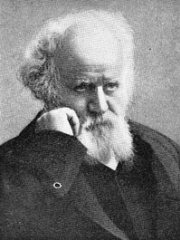
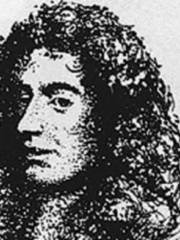
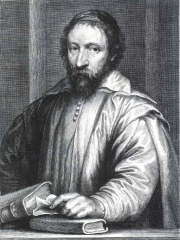

The Most Famous
ASTRONOMERS from France
This page contains a list of the greatest French Astronomers. The pantheon dataset contains 644 Astronomers, 53 of which were born in France. This makes France the birth place of the 4th most number of Astronomers behind Germany, and United Kingdom.
Top 10
The following people are considered by Pantheon to be the top 10 most legendary French Astronomers of all time. This list of famous French Astronomers is sorted by HPI (Historical Popularity Index), a metric that aggregates information on a biography's online popularity. Visit the rankings page to view the entire list of French Astronomers.

1. Nicolas-Louis de Lacaille (1713 - 1762)
With an HPI of 78.29, Nicolas-Louis de Lacaille is the most famous French Astronomer. His biography has been translated into 61 different languages on wikipedia.
Abbé Nicolas-Louis de Lacaille (French: [nikɔla lwi də lakaj]; 15 March 1713 – 21 March 1762), formerly sometimes spelled de la Caille, was a French astronomer and geodesist who named 14 out of the 88 constellations. From 1750 to 1754, he studied the sky at the Cape of Good Hope in present-day South Africa. Lacaille observed over 10,000 stars using a refracting telescope.

2. Charles Messier (1730 - 1817)
With an HPI of 75.05, Charles Messier is the 2nd most famous French Astronomer. His biography has been translated into 75 different languages.
Charles Messier (French: [ʃaʁl me.sje]; 26 June 1730 – 12 April 1817) was a French astronomer. He published an astronomical catalogue consisting of 110 nebulae and star clusters, which came to be known as the Messier objects, referred to with the letter M and their number between 1 and 110. Messier's purpose for the catalogue was to help astronomical observers distinguish between permanent and transient visually diffuse objects in the sky.

3. Jérôme Lalande (1732 - 1807)
With an HPI of 71.75, Jérôme Lalande is the 3rd most famous French Astronomer. His biography has been translated into 44 different languages.
Joseph Jérôme Lefrançois de Lalande (French: [lalɑ̃d]; 11 July 1732 – 4 April 1807) was a French astronomer, freemason and writer. He is known for having estimated a precise value of the astronomical unit (the distance from the Earth to the Sun) using measurements of the transit of Venus in 1769.

4. Édouard Stephan (1837 - 1923)
With an HPI of 71.54, Édouard Stephan is the 4th most famous French Astronomer. His biography has been translated into 36 different languages.
Édouard Jean-Marie Stephan (31 August 1837 – 31 December 1923) was a French astronomer. His surname is sometimes spelled Stéphan in some literature, but this is apparently erroneous. He was born in Sainte Pezenne (today one of the districts of the town of Niort) and attended the Ecole Normale Superieure, and graduated at the top of his class in 1862. He was the director of the Marseille Observatory from 1864 to 1907 (until 1872 he was subordinate to Urbain le Verrier). In the early part of his career there, he had limited opportunities to do observations because he was preoccupied with improving the observatory. He discovered the asteroid 89 Julia in 1866. In 1867 he used the new telescope to observe a transit of Mercury. Between 1870 and 1875, Stephan systematically studied nebulae, precisely recording their positions and discovering many new ones. His goal was to enable the exact measurement of stellar proper motions by creating a reference system of fixed objects. In 1873, Stephan was the first person to attempt to measure the angular diameter of a star using interferometry, converting the 80 cm telescope at Marseille Observatory into an interferometer. He did this by obscuring the reflector with a mask containing two vertical slits. The star he chose to perform this experiment was Sirius. He did not succeed in resolving any stellar disks, but by 1874 had obtained an upper limit to stellar diameters of 0.158" (the true angular diameter of Sirius is 0.0059 arcseconds, and for comparison, the angular diameter of Alpha Centauri and Betelgeuse are 0.0145 and 0.05 arcseconds respectively). In 1881 he discovered NGC 5, and he discovered the galaxy NGC 6027 the following year using the 80 cm reflector. Among others, he discovered Stephan's Quintet, also known as "Arp 319", a group of five galaxies. Stephan made this discovery with the first telescope equipped with a reflection coated mirror. In 1884 the French Academy of Sciences awarded him the Valz Prize (Prix Valz). His name is associated with the periodic comet 38P/Stephan-Oterma, although Jérôme Coggia saw it first. He became a Chevalier of the Légion d'honneur in 1868 and an Officier of the Légion d'honneur in 1879.
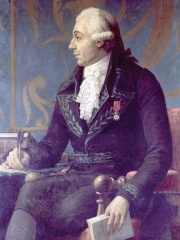
5. Pierre Méchain (1744 - 1804)
With an HPI of 70.29, Pierre Méchain is the 5th most famous French Astronomer. His biography has been translated into 40 different languages.
Pierre François André Méchain (French pronunciation: [pjɛʁ fʁɑ̃swa ɑ̃dʁe meʃɛ̃]; 16 August 1744 – 20 September 1804) was a French astronomer and surveyor who, with Charles Messier, was a major contributor to the early study of deep-sky objects and comets.

6. Pierre Janssen (1824 - 1907)
With an HPI of 70.21, Pierre Janssen is the 6th most famous French Astronomer. His biography has been translated into 47 different languages.
Pierre Jules César Janssen (22 February 1824 – 23 December 1907), usually known as Jules Janssen, was a French astronomer who, along with English scientist Joseph Norman Lockyer, is credited with discovering the gaseous nature of the solar chromosphere, and with some justification the element helium.

7. Jacques Cassini (1677 - 1756)
With an HPI of 69.17, Jacques Cassini is the 7th most famous French Astronomer. His biography has been translated into 38 different languages.
Jacques Cassini (18 February 1677 – 16 April 1756) was a French astronomer, son of the famous Italian astronomer Giovanni Domenico Cassini. He was known as Cassini II.

8. Nicolas-Claude Fabri de Peiresc (1580 - 1637)
With an HPI of 66.70, Nicolas-Claude Fabri de Peiresc is the 8th most famous French Astronomer. His biography has been translated into 31 different languages.
Nicolas-Claude Fabri de Peiresc (1 December 1580 – 24 June 1637), often known simply as Peiresc, or by the Latin form of his name, Peirescius, was a French astronomer, antiquary and savant, who maintained a wide correspondence with scientists, and was a successful organizer of scientific inquiry. His research included a determination of the difference in longitude of various locations in Europe, around the Mediterranean, and in North Africa. He is notably known for having been Galileo’s lawyer, a close friend of Rubens, an art advisor to Marie de' Medici, a pioneer of Egyptology, and for undertaking the first map of the Moon based on telescopic observations. Marc Fumaroli described him as the prince of the Republic of Letters.

9. Jean Chacornac (1823 - 1873)
With an HPI of 66.37, Jean Chacornac is the 9th most famous French Astronomer. His biography has been translated into 32 different languages.
Jean Chacornac (21 June 1823 – 6 September 1873) was a French astronomer and discoverer of a comet and several asteroids. He was born in Lyon and died in Saint-Jean-en-Royans, southeastern France. Working in Marseille and Paris, he discovered six asteroids in the asteroid belt (see table) and C/1852 K1 (Chacornac), a parabolic comet in 1852. This comet is thought to be the source of the current Eta Eridanids meteors. He also independently discovered 20 Massalia, which discovery is credited to the Italian astronomer Annibale de Gasparis, however. Jean Chacornac was awarded the Lalande Prize in 1855, 1856 and in 1863. The asteroid 1622 Chacornac and the lunar crater Chacornac are named in his honour.
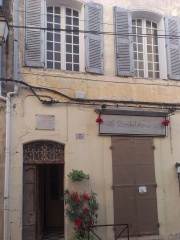
10. Auguste Charlois (1864 - 1910)
With an HPI of 66.26, Auguste Charlois is the 10th most famous French Astronomer. His biography has been translated into 30 different languages.
Auguste Honoré Charlois (French pronunciation: [oɡyst ɔnɔʁe ʃaʁlwa]; November 26, 1864 – March 26, 1910) was a French astronomer who discovered 99 asteroids while working at the Nice Observatory in southeastern France.
People
Pantheon has 53 people classified as French astronomers born between 1497 and 1952. Of these 53, 2 (3.77%) of them are still alive today. The most famous living French astronomers include Catherine Cesarsky, and Françoise Combes. The most famous deceased French astronomers include Nicolas-Louis de Lacaille, Charles Messier, and Jérôme Lalande.
Living French Astronomers
Go to all RankingsDeceased French Astronomers
Go to all RankingsNicolas-Louis de Lacaille
1713 - 1762
HPI: 78.29
Charles Messier
1730 - 1817
HPI: 75.05
Jérôme Lalande
1732 - 1807
HPI: 71.75
Édouard Stephan
1837 - 1923
HPI: 71.54
Pierre Méchain
1744 - 1804
HPI: 70.29
Pierre Janssen
1824 - 1907
HPI: 70.21
Jacques Cassini
1677 - 1756
HPI: 69.17
Nicolas-Claude Fabri de Peiresc
1580 - 1637
HPI: 66.70
Jean Chacornac
1823 - 1873
HPI: 66.37
Auguste Charlois
1864 - 1910
HPI: 66.26
Bernard Lyot
1897 - 1952
HPI: 65.76
Joseph-Nicolas Delisle
1688 - 1768
HPI: 65.63
Overlapping Lives
Which Astronomers were alive at the same time? This visualization shows the lifespans of the 25 most globally memorable Astronomers since 1700.

